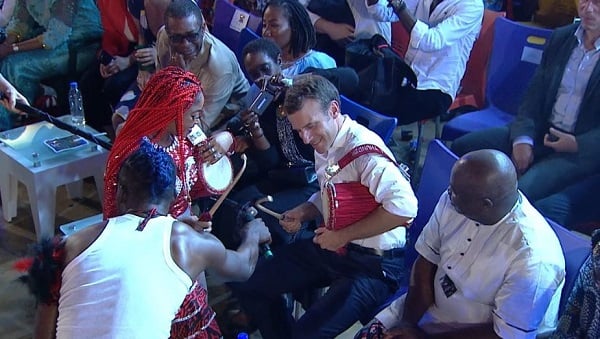The year 2018 brought with it several issues that influenced pop culture conversation.
Here, we curate a list of the top five issues and topics that played a dominant role in the Nigerian culture scene.
Emmanuel Macron at Fela Shrine
If Afrobeat pioneer, Fela Kuti, were alive today, would he have opened up his door to fete Nigerian politicians and Emmanuel Macron, president of France (a country that has been accused of neocolonialism and had a well known colonialistic past)?
Following the announcement that Macron would be visiting The New Afrika Shrine, home of Afrobeat, many questioned the reasoning behind this – given Fela’s very well known stance towards western powers, institutions, colonialism, neocolonialism, corrupt public officials and public office holders.
In spite of what may have been if Fela were alive, Macron’s visit to the Shrine was undoubtedly culturally significant.
Afropop making waves abroad
We’ve seen Nigerian artistes perform before huge crowds in distant places from London to New York. We have seen fans in these places excitedly scream their names, sing and dance along.
But it still came as a surprise when it was revealed that pop superstar, Davido, performed before 10,000 fans in the little known South American country, Suriname.
It wasn’t just that Davido had performed before such a large Surinamese crowd but the reception and the fact that, according to videos shared, the crowd knew Davido’s songs word for word.
And if one ever wonders how globally influential and popular Afropop and Nigerian arts are, Davido’s performance in Suriname stands as evidence.
Nollywood film distribution
Arguably, Genevieve Nnaji is Nollywood’s biggest star and her ambitions keep unfolding. This year, the actor directed and produced her first feature film, Lionheart, which was promptly snapped up by global streaming giant, Netflix.
However, Nnaji hasn’t had an easy time getting her film on the big screen.
She recently accused Filmhouse, a Nigerian cinema/film distribution house, of refusing to show her film in their cinemas simply because they were not involved in making the movie nor were they making any profit from it.
The allegation thus poses an existential question to the very claim by new Nollywood filmmakers: that their films made a certain amount of money at the cinema or was the highest grossing film or any other such claim.
If distribution companies buy their tickets and inflate figures to suit their agenda, how do we know which film is the highest grossing or isn’t without a third party audit?
But even more pertinent is the question of whether distribution companies should be involved in the production of films?
Falz and the definition of art
Rapper, Falz, released ‘This is Nigeria’, his cover of Childish Gambino’s ‘This is America’, and found himself in the middle of an important conversation.
While the song and its accompanying video were widely praised within and outside Nigeria, it was also called out as a failed artistic project, lacking not just originality but, perhaps more insidiously, careful execution and delivery.
No doubt Falz’s effort was from a good place but did it miss the mark as an artistic project? This issue further branched out into the failings of Nigerian creatives and how they can – and should – do better.
Misogyny, sexism and pop culture
As host of the 2018 AMVCAs, IK Osakioduwa made a poorly thought-out joke that was outrightly misogynistic and sexist. But Osakioduwa isn’t the first public figure to publicly exhibit his misogyny.
Rapper Falz has been in troubled waters as his songs, often with a moralistic and satirical undertone, have been called out for being unfair to women, shaming them for their choices while, conveniently, overlooking men.
Falz’s ‘Child of the World’ was the final straw, drawing several critical comments and analysis which then seeped into the broader problem of misogyny in pop culture products.
As her celebrity continued to grow this year, pop superstar, Tiwa Savage, has found her femininity come under scrutiny, microscopically examined and harshly criticised in a way that no male artiste has or will.
Tomboyish and unapologetic, Teni The Entertainer, has faced similar unfair gender-biased criticism when a popular podcast ranted about her presentation.
But long before Falz, Osakioduwa and their contemporaries, misogyny and sexism held sway in Nigeria’s pop culture scene.
Film critic, Wilfred Okiche, points this out in his essay – aptly titled: Nigeria is sadly still closer to Fela’s anti-feminism than to Wakanda’s women.
Copyright 2025 TheCable. All rights reserved. This material, and other digital content on this website, may not be reproduced, published, broadcast, rewritten or redistributed in whole or in part without prior express written permission from TheCable.
Follow us on twitter @Thecablestyle

